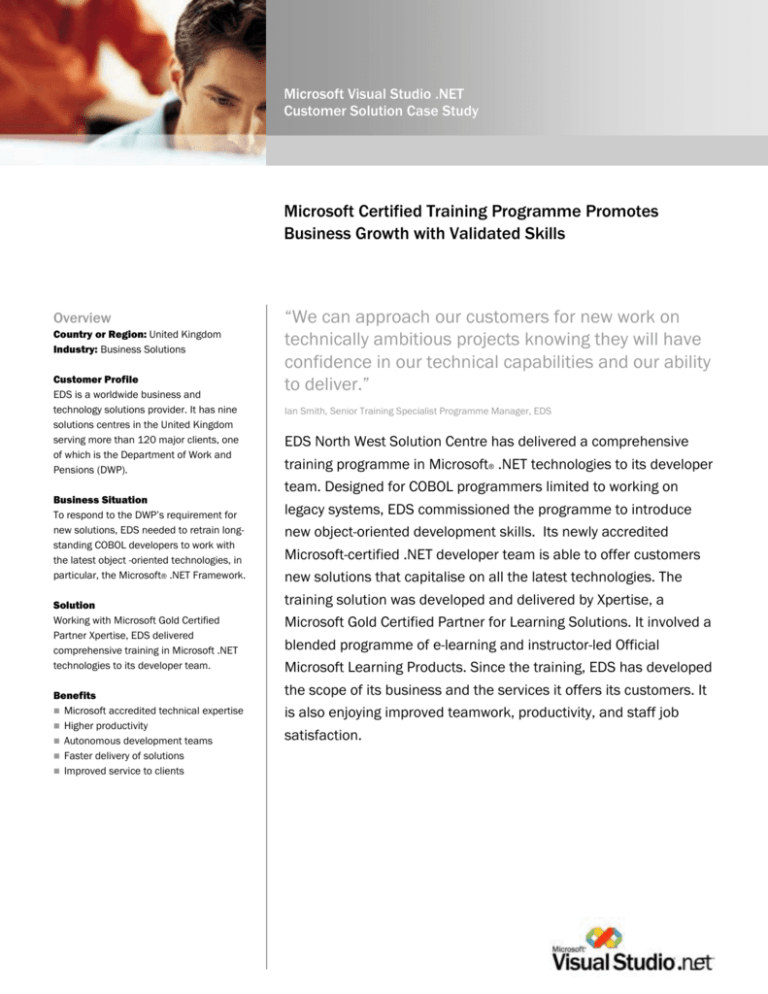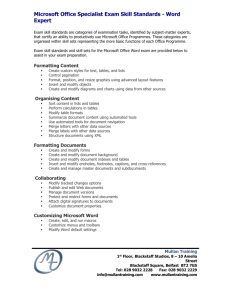
Microsoft Visual Studio .NET
Customer Solution Case Study
Microsoft Certified Training Programme Promotes
Business Growth with Validated Skills
Overview
Country or Region: United Kingdom
Industry: Business Solutions
Customer Profile
EDS is a worldwide business and
technology solutions provider. It has nine
solutions centres in the United Kingdom
serving more than 120 major clients, one
of which is the Department of Work and
Pensions (DWP).
Business Situation
To respond to the DWP’s requirement for
new solutions, EDS needed to retrain longstanding COBOL developers to work with
the latest object -oriented technologies, in
particular, the Microsoft® .NET Framework.
Solution
Working with Microsoft Gold Certified
Partner Xpertise, EDS delivered
comprehensive training in Microsoft .NET
technologies to its developer team.
Benefits
Microsoft accredited technical expertise
Higher productivity
Autonomous development teams
Faster delivery of solutions
Improved service to clients
“We can approach our customers for new work on
technically ambitious projects knowing they will have
confidence in our technical capabilities and our ability
to deliver.”
Ian Smith, Senior Training Specialist Programme Manager, EDS
EDS North West Solution Centre has delivered a comprehensive
training programme in Microsoft® .NET technologies to its developer
team. Designed for COBOL programmers limited to working on
legacy systems, EDS commissioned the programme to introduce
new object-oriented development skills. Its newly accredited
Microsoft-certified .NET developer team is able to offer customers
new solutions that capitalise on all the latest technologies. The
training solution was developed and delivered by Xpertise, a
Microsoft Gold Certified Partner for Learning Solutions. It involved a
blended programme of e-learning and instructor-led Official
Microsoft Learning Products. Since the training, EDS has developed
the scope of its business and the services it offers its customers. It
is also enjoying improved teamwork, productivity, and staff job
satisfaction.
Situation
EDS is a worldwide business and technology
solutions provider. The company established
a U.K. presence in 1984—across most
industry sectors—and it now serves more
than 120 major clients at one of nine centres
in the United Kingdom. Its core services
include infrastructure and business
processing outsourcing (BPO) and IT
transformation services.
In 2000, the U.K. government’s Department
of Social Security, now known as the
Department of Work and Pensions (DWP),
outsourced the work of its IT Services Agency
to EDS. The DWP is now one of the
company’s major accounts and work for the
department is conducted at the EDS North
West Solutions Centre, based at three sites in
the Blackpool area.
In early 2003, the DWP approached EDS to
develop a new justice system for criminal and
civil courts throughout the United Kingdom. A
core requirement was that the project should
adopt new object-oriented technologies.
Ian Smith, Senior Training Specialist
Programme Manager at EDS, recalls, “Most
of the DWP systems were old legacy
government systems written in COBOL. Many
of our staff had been dealing with them for
numerous years and were unfamiliar with the
concepts of object-oriented development. To
prepare them to work on the new project, we
needed to train them to use the new
technologies and, in particular, the
Microsoft® .NET Framework.”
Although EDS does provide training internally,
the company recognised it did not have the
technical skills or facilities it needed to
conduct a .NET Framework training
programme within the Solutions Centre.
Smith confirms, “We realised we needed an
external solution from a recognised training
supplier and took the decision to commission
a full training programme.”
The requirement was for a comprehensive
training programme for up to 50 staff. To
overcome the practical limitations of staff
availability, it had to be a blended programme
that mixed formal instructor-led classroom
sessions with more flexible online selflearning activities.
Smith summarises, “We needed an intense
programme and accepted that the staff
involved would in the main be lost to their
projects for a period of several months. The
commitment was significant, but we
understood that the success of the training
programme was vital to EDS and the North
West Solutions Centre in particular. We had
to produce .NET Framework developers who
could move straight into the role and be
immediately productive. And we had to
achieve this by April 2004.”
Solution
EDS approached a number of training
suppliers for help with the programme.
Following a formal tender process, EDS
selected Xpertise for its ability to meet the
requirements in full. Xpertise Group plc is a
skills solutions provider for IT professionals,
developers, and end users in the United
Kingdom.
Smith was impressed: “Xpertise offered a
flexible blended training solution that would
meet all our needs. We were clear from the
outset that the opportunity for Microsoft
certification was essential. As a Microsoft
Certified Partner for Learning Solutions,
Xpertise would not only provide the training
we needed, it would also ensure each
developer’s new skills could be validated and
Microsoft certified.”
Xpertise was awarded the contract in July
2003. Steve Brennan, Microsoft Business
Development Director at Xpertise, explains
how the programme began: “Following an
initial consultation period to define EDS’s
precise requirements, we conducted a skills
analysis programme in September 2003. Our
chief learning architect scoped out the
tailored content of the programme and then
our project management team scheduled the
courses to ensure we would meet EDS’s
deadlines. We were ready to start by October
2003.”
EDS had no difficulties recruiting staff to the
programme. Developers with predominantly
legacy skills responded enthusiastically to
evangelism seminars designed to inspire
initial interest and commitment. They were
well aware how important this opportunity
could be.
Following initial skills assessments, EDS
selected 50 candidates to begin a
comprehensive training programme in
October. Xpertise assigned three instructors,
guided by a lead-instructor, to deliver the
training and provide technical and
professional mentoring throughout the
programme.
Brennan describes the programme: “To
overcome the initial challenge of changing
the mindset of developers who had worked
with COBOL for many years, the programme
began with a five-day object-oriented analysis
and design course, before progressing onto
the .NET Framework specifics.”
He continues, “To deliver a blended
programme that would support different
learning styles and meet EDS’s operational
requirements, we combined Microsoft Official
Curriculum [MOC] classroom-based delivery
with EDS e-learning materials. The Microsoft
Visual C#® .NET 2003 [development tool] and
Microsoft ASP.NET training was instructor-led,
supplemented by e-learning products given to
candidates as a course prerequisite or as
homework. In contrast, the Microsoft
ADO.NET training was delivered as an elearning self-study course, supported by oneto-one mentoring and a plenary workshop for
those that needed it.”
An essential objective for EDS was to give
candidates the opportunity to gain Microsoft
Certified Professional (MCP) accreditation.
Today, 90 percent of those who completed
the training are Microsoft Certified
Professionals. Smith is delighted: “Formal
Microsoft certification creates valuable
business assets for EDS and having
candidates demonstrate their successful
acquisition of skills in this way also helped to
ensure that the training was correctly aligned
to people’s roles in the workplace.”
Inevitably, there is a temptation for certified
developers to consider the wider employment
market place, but loyalty remains very high.
Smith explains, “To encourage the newly
qualified staff to remain with the company,
EDS set up an internal mentoring network
and follow-up workshops to help them
maintain and further develop their skills.
However, the biggest incentive is that we are
busy and there is plenty for them to do. A
year later, only one has moved on, which is
well within the normal volumes of staff
turnover.”
Brennan is not surprised: “It is a myth that
once people are certified they inevitably look
for new opportunities. Instead, organisations
that invest in their people gain loyalty. We
find that employees who receive
opportunities to develop professionally and
gain accreditation are the people who stay
with their employers.”
Smith is delighted with the success of the
programme: “Xpertise met our requirements
in full and exceeded our expectations. We
now have a core capability in .NET
development. It has broadened the scope of
work we do for the DWP and extended our
relationship with this important client. For our
developers it has opened up an entire new
world that exposes them to modernisation
work instead of legacy maintenance.”
Benefits
Strengthening Staff Morale and
Confidence
The members of the EDS development team
supporting the DWP are committed to their
work. However, while the focus remained on
maintaining legacy COBOL systems,
opportunities to develop professional skills
were very limited. Naturally, this was a
concern for staff, many of whom had worked
for years as COBOL developers and faced
more doing the same.
As Smith is happy to acknowledge, things
have changed dramatically: “Retraining as
.NET developers has provided the EDS DWP
team with extremely marketable skills. The
Microsoft accredited training has allowed
them to move into our modernisation work,
dealing with new solutions. Knowing they are
members of a highly regarded team skilled in
the latest technologies has dramatically
improved their job satisfaction and
confidence in their professional abilities and
talents.”
Promoting Individual Excellence
This is demonstrated by the outstanding
success of one candidate in particular, who
voluntarily mentored other less experienced
people on the programme and eventually
joined the training team. As a result of his
progress he was invited onto the EDS Top
Gun Programme. Supported by Microsoft, the
EDS Top Gun Programme provides
outstanding individuals with an opportunity to
spend several months working with Microsoft
in Redmond, Washington developing new
advanced technologies.
Smith explains, “This is a very exclusive club.
Candidates for the programme are selected
from EDS worldwide. Total numbers so far are
barely into double figures. An invitation to join
the programme is a real honour. This is an
excellent example of the potential our .NET
training programme holds for each individual.
It highlights the importance of our
commitment to the professional development
of our employees. As a result of this
individual’s achievement, the rest of the team
has a benchmark to aspire to. This success is
positively affecting the performance of each
individual.”
Improved Teamwork and Productivity
In contrast to older procedural development
technologies, the object-oriented flexibility of
the .NET Framework provides opportunities
for developers to work together as a team
and to collaborate far more effectively than
before. Following the training, the
improvement in productivity is clear from the
faster completion of projects and the
increased output of each developer.
“Various features of the .NET Framework
environment, such as the use of reusable
code and separate code layers, allow
developers to share the effort of development
in ways that were previously impossible,”
says Smith. “Team members can share code
and work on different elements of the same
project, knowing that all the parts will fit
together in the end. The result is more
efficient production and we can assign fewer
people to achieve the same amount of work.”
Microsoft Accredited Technical Expertise
Brennan agrees, but offers a different
perspective that also emphasises the
benefits of recognised validation for EDS’s
new skills: “We built the programme content
to align with people’s roles in the workplace
and to facilitate Microsoft Certified
Professional accreditation. In doing so, we
have increased collaboration between
developers, improved productivity, and
provided them with Microsoft certification
that EDS’s customers recognise as a mark of
the quality service EDS delivers.”
Smith acknowledges the long-term
advantage: “MCP accreditation provides
universal validation of our new expertise in
the .NET technologies. We can approach our
customers for new work on technically
ambitious projects knowing they will have
confidence in our technical capabilities and
our ability to deliver.”
Faster Delivery of Solutions
By making it easier for developers to
collaborate, the .NET Framework also
reduces the overall time it takes EDS to
develop solutions for its customers. The
COBOL development environment made it
necessary to involve numerous teams in the
overall project. Today, the need to coordinate
the stages of development between different
teams no longer exists, shortening the overall
time projects require.
Smith explains, “Under COBOL we needed
separate design, programming, and testing
teams. By contrast, the .NET developer is a
more well-rounded professional, able to
perform the entire life cycle of development.
As a result, we can lodge new work with a
.NET development team where it remains
until it is fully tested and released. This has
made a huge difference to the duration of
development projects.”
Improving Service to Clients
Although the DWP is one of EDS’s largest
clients, in the past the service the North West
Solutions Centre could offer was limited to
support for government benefit legacy
systems that used the older COBOL
technology. Following its Microsoft-certified
.NET developer training programme, EDS can
offer a far broader range of development
services.
Smith is clear about the benefits: “The
Microsoft Certified Professional training our
developers have received has given us the
opportunity to develop our relationship with
our premiere client. We are no longer limited
to the maintenance of their legacy systems.
Instead, we can help them develop new
solutions that take the fullest advantage of
the latest technologies to enable them to
improve their own performance and the
service they deliver to their clients.”
Extending Business Opportunity
As well as benefiting its clients with improved
services, removing such barriers is also
providing significant benefit to EDS. The
Microsoft-accredited .NET training
programme has introduced many new
possibilities. In particular, being skilled in
.NET technologies is making it possible for
EDS to gain a share of the lucrative Internetdevelopment and Web-design markets.
The possibilities excite Smith: “The scope of
.NET Framework development is huge,
especially given the increasing importance of
the Web in the delivery of public information
and services. Many new opportunities with
the DWP have opened up to us with the
Microsoft accredited training our team has
received. Since then, our involvement in .NET
development has expanded significantly and
is now a considerable programme within our
solution centre. It far outstrips any Java and
J2EE work we do.”
For More Information
Microsoft Visual Studio .NET
For more information about Microsoft
products and services, call the Microsoft
Sales Information Center at (800) 4269400. In Canada, call the Microsoft
Canada Information Centre at (877) 5682495. Customers who are deaf or hard-ofhearing can reach Microsoft text telephone
(TTY/TDD) services at (800) 892-5234 in
the United States or (905) 568-9641 in
Canada. Outside the 50 United States and
Canada, please contact your local
Microsoft subsidiary. To access information
using the World Wide Web, go to:
www.microsoft.com
An integral component of the Microsoft
Windows® operating system, the Microsoft
.NET Framework is for building and running
the next generation of applications and XMLbased Web services. It provides a highly
productive, standards-based, enterpriseready, multilanguage environment that
simplifies application development, enables
developers to take advantage of their existing
skill set, facilitates integration with existing
software, and eases the challenges of
deploying and operating Internet-scale
applications. The framework consists of two
main parts: the common language runtime
and a unified, hierarchical class library that
includes a revolutionary advance to Active
Server Pages (ASP.NET), an environment for
building smart client applications (Windows
Forms), and a loosely coupled data access
subsystem (ADO.NET). For more information
about the Framework, go to:
www.msdn.microsoft.com/netframework/
For more information about Xpertise
products and services, visit the Web site at:
www.xpertise.co.uk
For more information about EDS products
and services, visit the Web site at:
www.eds.com
Software and Services
Microsoft Visual C# .NET 2003
Microsoft Visual Studio® .NET 2003
Services
− Microsoft Certified Professional
− Official Microsoft Learning Products
© 2005 Microsoft Corporation. All rights reserved.
This case study is for informational purposes only. MICROSOFT
MAKES NO WARRANTIES, EXPRESS OR IMPLIED, IN THIS
SUMMARY.
Microsoft, PowerPoint, Visual C#, Visual Studio, the Visual
Studio logo, and Windows are either registered trademarks or
trademarks of Microsoft Corporation in the United States and/or
other countries. All other trademarks are property of their
respective owners.
Document published June 2005
Technologies
− Microsoft .NET Framework
− Microsoft ADO.NET
− Microsoft ASP.NET
Partners
− Xpertise Group plc







